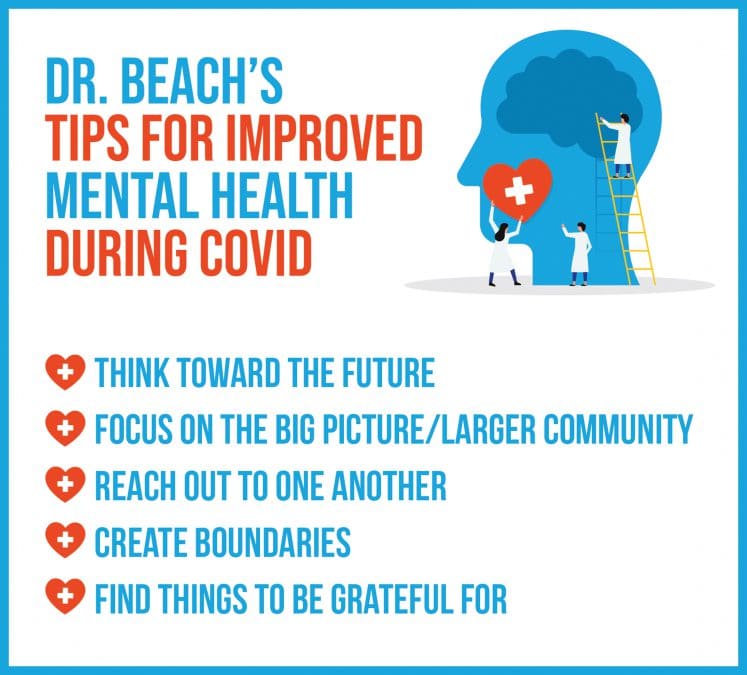Approximately seven months since the pandemic’s onset in the United States, many people experience exhaustion in this time of heightened tensions, including fears of uncertainty, added responsibilities or adjusting to more time alone. The added anxiety can result in a lack of motivation or positivity. However, Citizen Potawatomi Nation Behavioral Health Department Psychologist Shannon Beach, Ph.D., finds thinking ahead helps replenish spirits.
“I think a lot of people, when they look at it and say, ‘This is a temporary norm,’ that gives hope. That’s just the look toward the future. That kind of idea that we can keep trudging through this, and eventually, we’ll come out on the other side. And I think if we all band together and wear our masks, then we’ll get there just that much quicker,” he said.

Maintaining focus
The constant flood of information regarding the coronavirus can cause people to become overwhelmed, frustrated and irritated.
“And I think that a lot of this is pretty similar for a lot of people in that we’ve done so much and that it just kind of seems repetitive and old,” Beach said. “It’s definitely not. We definitely do need to take all of our precautions now just as much, if not more, as in the past because I think as people get more accustomed to it, it’s easier to become more lackadaisical.”
Beach recommends keeping the big picture in mind to overcome those hurdles while adhering to guidelines from medical and civic leaders.
“Working with Native people, I think there’s a lot more community in general than the typical Western culture,” he said. “People do have that idea of ‘We need to do things that are best for the community and do things that are best for everybody’s safety. It’s not just about me.’ So, I think people are willing to do these things, but at the same time, that doesn’t mean that you can’t get irritated or frustrated or stressed or things like that.”
Improved state of mind
In recent months, Beach has noticed a shift in anxiety focused first on the virus and sickness to its consequences now, such as quarantine, uncertainty, life management and more. During a recent Hownikan interview, Beach said people mainly feel “cooped up” and long to return to life and one another. He suggests finding solace in shared experiences and recognizing unpleasant emotions as a logical outcome of the circumstances.
“When we do commiserate with each other about the problems that we’ve had, we can oftentimes find solutions — find ways to navigate these waters,” Beach said. “We’re not going to fix this today, but we can address where we are today and how we get to that next place.”
While many lost jobs in the last few months, others began working harder than ever before. According to Beach, creating healthy limits feeds mental stability, and self-care comes first.
“We certainly need to have boundaries sometimes, and we live in a country where it’s kind of considered honorable to just work and work and work and not consider yourself,” he said.
Finding things to be grateful for — even small ones — is also a healthy habit. Beach puts this idea into action with his morning cup of coffee. It keeps him grounded, and the taste and smell provide a bright start to each day.
“I’m thankful for it, and I can express that, and when I think about that, it can be helpful,” he said. “Not just with coffee, though. We want to express gratitude to other people. That’s definitely going to help boost the mood whenever we really focus on them and focus on what we’re truly, truly thankful for.”
While that sometimes seems impossible, it is important to remember new experiences resulting in tangible change often bring anxiety and require time for adjustments.
“We get to be who we are through practice, and we don’t have any practice with this. This kind of thing hasn’t been present since (the 1918 flu pandemic). People don’t have the practice to live in this kind of way so much. So there is a lot more stress because we’re all kind of sailing uncharted waters,” he said.
Beach always recommends counseling.
Citizen Potawatomi Nation Behavioral Health Services is available at 405-214-5101. Reach the National Suicide Prevention Lifeline at 1-800-273-TALK(8255) or text CONNECT to 741741, or online at suicidepreventionlifeline.org.
